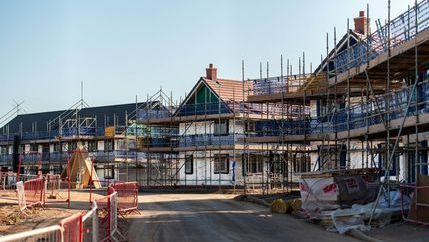Meaningful home buying and selling reform must deliver for agents and consumers
Propertymark supports the UK Government’s ambition to reform the home buying and selling process and agrees that change is long overdue. Reform must be practical, proportionate and focused on outcomes. By improving upfront information, raising professional standards, embracing digital solutions and reducing duplication, reform can deliver faster, more reliable transactions that work for agents, consumers and the wider economy.
Material information reform must be shared, digital and realistic
Proposals to standardise the details provided in property listings are intended to improve transparency, speed up transactions and reduce fall-throughs, but without the right structure, shared responsibility, and practical implementation, the reforms risk placing unrealistic burdens on agents and slowing the process further. Propertymark supports the principle of better upfront information, but stresses that the current approach does not reflect how transactions work in practice.
Member-backed campaigning delivers real change as Commonhold reform finally arrives
The UK Government has published the Draft Commonhold and Leasehold Reform Bill and launched a consultation on banning leasehold for new flats, marking a significant moment in the long-running debate over leasehold reform. For Propertymark, this represents a major milestone after nearly 10 years of sustained campaigning against leasehold, ‘fleecehold’ practices, and unfair ground rents.
Single sanctions list launches on 28 January 2026 for simpler checks
All UK sanctions designations maintained by the UK Government will be consolidated into an official list and updated in one place. This is a significant operational change for property agents, auctioneers and other regulated businesses, which should make checking clearer and more straightforward. Sanctions compliance are part of wider financial sanctions and anti-money laundering obligations, and failures can carry serious legal and reputational consequences.
Warm Homes Plan sets 2030 energy efficiency deadline for the PRS
The UK Government is investing £15 billion and promises a major push to cut bills, tackle fuel poverty, and accelerate home upgrades. In response to our campaigning, the initial 2028 deadline for new tenancies has been scrapped and, with a lower cap amount, property owners will be expected to spend less on upgrades. However, we remain concerned that landlords are being asked to deliver significant change without sustained, targeted support.
Budget offers positive funding increases, but housing pressures persist
The Welsh Government’s 2026–27 Budget, approved by the Senedd on 27 January 2026, includes extra support for councils, changes to business rates from April 2026 and more funding for Green Home Wales, but key opportunities were missed to support rental supply and first-time buyers.
Protecting long-term housing supply requires broader focus than holiday lets
Propertymark has provided the Welsh Government with clear evidence on how short-term and holiday lets affect housing supply, communities and the work of property agents in response to the latest plans for the regulation of self-catering visitor accommodation.
TPO raising consumer awareness of conditional selling
The Property Ombudsman (TPO) has issued new guidance in responding to growing concern about the prevalence of aggressive practices in the home-buying process, empowering buyers to recognise and challenge unfair practices. With complaints on the rise and increased scrutiny from redress schemes and Trading Standards, estate agents should take time to review their processes, staff training and messaging to ensure compliance.
Another Budget fails to address housing emergency
Despite a multi-year commitment to affordable housing supply and increased investment in acquisitions and homelessness prevention, it is surprising that the Scottish Government is yet again failing to tackle the housing emergency, and the Budget misses an important opportunity to address the growing tax burden on housing. At a time of acute housing pressure, Scotland needs policies that encourage mobility and investment across all tenures.
Trust qualification bursaries open until 31 January 2026
Following the success of the Class of 25 initiative, The Propertymark Trust has opened its 2026 bursary programme, offering vital financial support to individuals working towards industry qualifications. Promoting professionalism and supporting access to education for people who would otherwise struggle to meet the costs of training, membership and assessment sits at the heart of the Trust’s work.
Vital intel for property agents as Ofgem becomes heat networks regulator
Formal regulation marks a major shift in how these systems are overseen and how consumers are protected. For property agents, this change is important because it will affect how heat networks are operated, what information consumers must receive, and how agents advise clients and market properties connected to networks. Hundreds of thousands of homes, particularly in blocks of flats and new developments, are already connected, and their use is expected to grow as part of the UK’s decarbonisation plans.
Government leasehold reform delay sparks new calls for action
In a major setback for long-awaited housing reform, the UK Government has failed to publish the draft Commonhold and Leasehold Reform Bill before the end of 2025 as repeatedly promised to Parliament — delaying crucial leasehold overhaul legislation until early 2026. The omission, confirmed in correspondence from Housing Minister Matthew Pennycook to the Housing, Communities and Local Government (HCLG) Committee, has drawn sharp criticism from MPs, campaigners and sector bodies alike.
Parliament sets out next round of reforms as Planning Bill becomes law
The Ministry of Housing, Communities and Local Government (MHCLG) is keeping up the pace of change by beginning consultation on ‘definitive’ changes to the National Planning Policy Framework (NPPF) before the ink is dry on the newly approved Planning and Infrastructure Act 2025, which received Royal Assent on 18 December 2025. The latest proposals are the final step in the regearing of the planning system, which the UK Government says will be followed by a period of stability and laser-focused delivery.
Reform, regulation, and regeneration: shaping the property sector in 2025
Propertymark has worked tirelessly to ensure members’ voices are heard, practical concerns are addressed, and reforms are workable as the UK and devolved governments have pushed ahead with major legislative changes. Long-standing challenges around supply, affordability and standards have remained firmly in focus, and we will continue to scrutinise legislation, challenge unclear proposals and provide practical guidance to support members as reforms move from policy into practice across the UK.
Rising costs and shifting tenures captured in latest national snapshot
The English Housing Survey (EHS) for 2024-25 provides a detailed picture of how people across England are buying, renting and coping with rising housing costs. For Propertymark members, the findings highlight important shifts in first-time buyer behaviour, demand in the private rented sector (PRS), and growing affordability challenges — with London continuing to stand apart from the rest of the country.
Stay in control as AI-generated complaints rise
Member feedback has highlighted the growing phenomenon of AI tools helping consumers create detailed, legal-sounding complaints in minutes. While many complaints are reasonable and well-intentioned, the speed and volume made possible by AI are creating new pressures for property agents, especially smaller firms with limited staff capacity. Propertymark is working to ensure members are supported through clear guidance, professional standards, and a strong voice with policymakers.
















